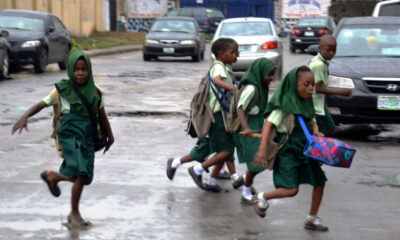Education
Parents Lament, Threaten To Withdraw Kids As Schools Hike Fees

Many private primary and secondary schools across the states have increased their fees ahead of the new academic year.
Many of the parents said they have been notified of increments in school fees, feeding, transportation and cost of uniforms.
While some parents said that it has become a norm for most private schools to increase fees at the beginning of every session, some schools said the increase was with the consent of stakeholders who also acknowledged the prevailing economic situation occasioned by rising inflation and deteriorating value of the naira.
Findings revealed that some schools have increased their fees by between 30 and 50 per cent.
It’s unbearable – Parents
Many parents in Abuja, Kano, Lagos, Port Harcourt, and other states lamented the increase in school fees of their children in private schools.
Some of them said if public schools were functioning well, they would have no reason to take their children to private schools.
Abdullahi Usman, whose two children attend a private primary school around Life Camp in Abuja, said, “The increment is appalling. We used to pay N200, 000 per child per term in primary school but it is now N280, 000. This excludes uniforms and books.”
READ ALSO:
- Britain sends underwater drones to clear Ukrainian grain exports of mines
- Terrorists invade Kaduna farm, kill soldier, abduct two
- 2023 presidency: APC chairman goes spiritual over Tinubu’s victory
Jeniffer Samuel said the fees for her four-year-old granddaughter who is going to nursery one is N170,000.
“Her father would also have to buy uniforms and books from the school…It is sad because they don’t allow parents to go to the market and buy the uniforms. They make a lot of fortune from it.”
Asked why she will not take the girl to a public school, which is free, Jenifer said, “We all attended public schools during our days but the dynamics are different now. This is the truth; if you want your children to excel, you have to pay heavily for their education,” she said.
Another parent, Mr Kelvin Oji said her children’s school increased fees by 25 per cent for the new session.
“I didn’t even go through the paper to know why they are charging because it has become a norm, they always increase fees.
“The last two sessions recorded 10 and 15 per cent increment, but now they have raised it by 25 per cent,” he said.
Abdulkadir Abubakar, a trader in Kano and father of three, said that the increment was meant to exploit parents.
“I don’t see any reason why the schools are increasing their fees; there is nothing new about their service to our children to warrant any review. The state government or the school regulatory agency should come to our aid.”
For Malam Aminu Ibrahim, a civil servant, private schools were becoming business ventures that the owners use to exploit parents.
Alhaji Ado Sale, a businessman, said that he was considering enrolling his children in public schools because of the arbitrary increase in fees in private schools.
Malama Hadiza Ali, a widow who has four children in private schools, said: “Apart from school fees, I have so much on my neck, like feeding, rent and so on. I am thinking of enrolling them into a public school instead.”
In Lagos, a banker, Mr Lawrence Olu, lamented that school fees take the highest portion of parents’ annual income, it had reduced the standard of living for households.
“My son’s school has increased the fee by over 15 per cent. I have decided to withdraw my son from the school because I cannot cope.”
Another resident of Lagos, Uncle Sam said the economic situation of the country is making life difficult for him, despite being a salary earner.
“Sincerely, this is not going to be easy for parents because even the summer lessons fees were increased above 50 per cent compared to what we paid last time. We understand the situation of the economy but most of these schools are taking advantage of the situation to exploit parents,” he said.
A Vulcaniser in Ikeja, Mr Waheed Shamsudeen said he will withdraw his four kids from a private school they are attending because of increased fees.
“Though I promised my wife before she died that I was going to do all I can to give the kids a good education, at this point, I can no longer cope with high school fees.”
A parent in Port Harcourt, Onyeka Imeadi said, “We used to pay N30, 000 but the management of the school wrote to inform us that the school fees will be increased to N50,000 from the next academic session.”
‘No salary increase for teachers’
Checks by our correspondents showed that most of the schools have no plan to increase the salaries of their staff members.
A teacher in a private school in Oyigbo, Lagos said the management of the school is using the economic situation in the country as an excuse to hike the school fees.
“Some schools are hiking the school fees, but they are being selfish because the increase has not in any way extended to us the teachers.
“They have increased fees in the school. I teach in, using the economic situation as an excuse but I want to let you know that my salary has remained the same without any increase,” he said.
Khamis Aliyu, who teaches in a private school in Jos, Plateau State said he is looking for another job.
“I am a graduate but I get N25,000 as salary in the private school I teach. This is not enough to buy grains for my family for one month.
“We are humans, we deserve empathy. We pay for food items, electricity, transportation, house rent and school fees for our children, among others.
READ ALSO:
- ASUU holds crucial NEC meeting today
- Alex Iwobi: Everton can compete with the best
- London meeting: No deal with Atiku — Obi/Datti Campaign
- CBN leading economic diversification – Emefiele
“Private school proprietors are greedy. Our counterparts in public schools earn more but ironically, parents take their children to private schools,” he said.
Sadiya Musa, a 300-level student of Ahmadu Bello University (ABU), Zaria, said she is paid N9, 000 in the private school she is teaching in.
“I have been teaching since after I finished my diploma. I continued to teach even after I got admission for my degree programme but the take-home pay is not really encouraging,” she said.
Inflation behind increase – Proprietors
The Chairman of Voyage International School, Abuja, Yussuff Oriyomi said they did not increase school fees but slightly reviewed the cost of feeding, transportation and uniforms.
He said the increase is by about 20 per cent for obvious reasons, as costs of food commodities keep increasing weekly.
“We import the uniforms from the UK and we all know what the exchange rate is today; so we have to adjust our charges.”
A proprietor of a private school in Rivers State, Lotanna Agbai said given the economic situation in the country they have to increase the school fees.
“If you look at the present economic situation in the country, you will find out that things are getting out of hand. We have to make little adjustments to see how we can take care of the cost of running the school. We have staff wages to take care of and we also have utility bills to pay. These are the factors we put into consideration before we come out with the little adjustment we made in our fees,” he said.
A school proprietor in Kano, who doesn’t want his name to be mentioned, said the issue of high fees in private schools was not new.
“Any parent who sends his children to private school should know that he/ she would have to pay more. So it is voluntary. That is why the schools are called private schools, private arrangements. When you say private school, you expect all facilities to be up to date, functioning with experienced staff.”
Another school proprietor, Hajiya Aisha Ahmad of AlHidayah Academy, said that the fees were increased due to the inflation in the country as private schools were involved in running so many things which needed money.
Many of the proprietors, however, said the increment in tuition fees might not necessarily translate to an increase in the salary of teachers.
They said the increase was meant to cater for the day-to-day running of the schools.
Daily Trust
Education
Increase in first-class degrees from private varsities worries ASUU

Increase in first-class degrees from private varsities worries ASUU
The Academic Staff Union of Universities (ASUU) has expressed concern over the increasing number of first-class graduates being produced by private universities in Nigeria.
Speaking at an event in honor of Prof. Andy Egwunyenga, the outgoing Vice Chancellor of Delta State University (DELSU), ASUU National President, Prof. Emmanuel Osodeke, warned that such trends, if replicated by public universities without proper regulation, could undermine the integrity of academic achievements.
The ceremony, held at DELSU’s Abraka campus, saw Osodeke reflecting on the broader state of education in Nigeria. He lamented that students graduating from primary and secondary schools with high grades often lack adequate knowledge and skills.
The ASUU president also raised alarm over the ongoing “mass exodus” of skilled Nigerian professionals to countries offering better work conditions, linking the trend to systemic failures in education and other sectors. He cited incidents such as building collapses as evidence of institutional shortcomings.
READ ALSO:
- Police, immigration officers jailed seven years for employment fraud
- FG hands over $3bn Port Harcourt-Aba railway project to NRC
- Naira appreciates to N1,740/$ in parallel market
“There was a time when academics enjoyed a decent quality of life,” Osodeke said. “Now, the situation has changed, and unions must renew efforts to advocate for fair conditions. ASUU will continue to champion justice and equity in academia.”
Another ASUU member, Prof. Omotoye Olorode, presented a paper titled “New University Curricula (CCMAS): Context and Matters Arising,” criticizing the CCMAS as a tool of foreign influence designed to disrupt Nigeria’s academic frameworks. He argued it perpetuates a system where Africans are relegated to supporting the agricultural needs of developed nations.
“Nigeria has never allocated more than seven percent of its budget to education, far below UNESCO’s recommendation of 26 percent,” Olorode noted. “This reflects the stagnation in our education sector.”
The event also celebrated Egwunyenga’s achievements as vice chancellor. DELSU ASUU Chairman, Dr. Paul Opone, commended Egwunyenga for his leadership, stating, “Since 2019, the institution has struggled with poor leadership. Prof. Egwunyenga met and exceeded the expectations of ASUU and the university community, earning widespread respect.”
In his response, Egwunyenga expressed gratitude for the accolades, crediting his leadership style to the themes in Festus Iyayi’s book, Demons and Monsters. He highlighted the support he received from all parts of Delta State during his tenure.
“This is the first time ASUU has celebrated a DELSU lecturer in this manner,” Opone added. “Prof. Egwunyenga truly deserves the recognition.”
Increase in first-class degrees from private varsities worries ASUU
Education
TETFund stops fresh foreign scholarships for varsity lecturers, others

TETFund stops fresh foreign scholarships for varsity lecturers, others
The Tertiary Education Trust Fund (TETFund) has suspended its foreign scholarship component under the TETFund Scholarship for Academic Staff (TSAS) Intervention.
The decision, attributed to rising overseas training costs and increasing cases of abscondment, will take effect from January 1, 2025.
This was disclosed in a letter signed by TETFund’s Executive Secretary, Arc. Sonny Echono addressed the heads of beneficiary institutions, including vice-chancellors, rectors, and provosts.
The letter, dated November 25, 2024, stated:
“In response to the current excessive cost of training in foreign institutions, coupled with the high rate of abscondment of scholars, the Board of Trustees of the Fund has approved the suspension of the foreign component of the TETFund Scholarship for Academic Staff (TSAS) Intervention.”
READ ALSO:
- VIDEO: Fire guts Radio Nigeria Lagos office
- Tinubu appoints Jami’u Abiola as Senior Special Assistant
- Hoodlums beat police officer to death in Adamawa
Institutions have been advised to prioritize local training needs, ensuring the programme is implemented within Nigerian institutions.
Echono emphasized that this shift is intended to reduce pressure on foreign exchange reserves, enhance investment in local academic capacity, and expand the number of beneficiaries.
He further clarified that scholars currently enrolled in foreign institutions under the programme will continue to receive sponsorship until they complete their studies.
This move reflects TETFund’s strategic focus on optimizing resources and strengthening local education systems to achieve a broader impact.
TETFund stops fresh foreign scholarships for varsity lecturers, others
Education
Poly lecturers to embark on nationwide strike from Dec 2
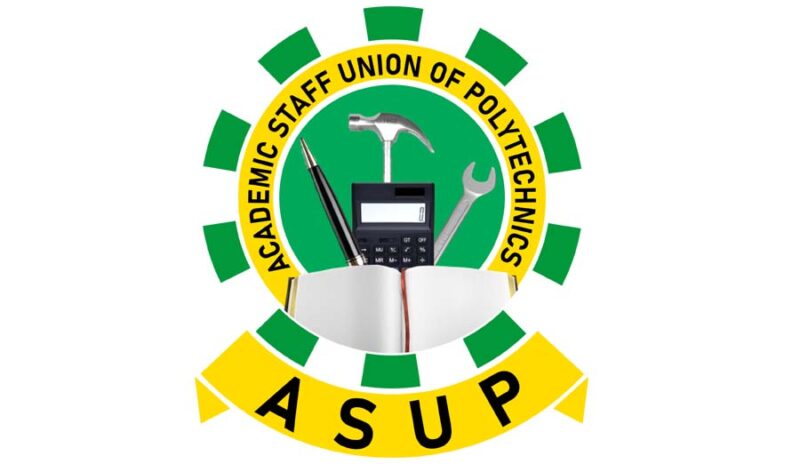
Poly lecturers to embark on nationwide strike from Dec 2
The Chairman of the Academic Staff Union of Polytechnics (ASUP), Kaduna Polytechnic Chapter, Comrade Abubakar J. Abdullah, said the union will shut down all polytechnics nationwide by December 2 due to the Federal Government’s failure to meet its demands.
He explained that the union leadership issued a 15-day ultimatum to the Federal Government on October 6, 2024, outlining pressing demands aimed at resolving the systemic challenges that hinder the progress of polytechnics. However, he said the government failed to address the issues.
Speaking at a news briefing on Tuesday, Nov. 26, in Kaduna, the chairman listed some of the demands, including swift release of the second tranche of the NEEDS Assessment Intervention fund, immediate implementation of the approved 25/35% salary review across all public polytechnics, and the payment of accrued arrears.
READ ALSO:
- Gunmen abduct three people from Anambra community
- Tron Founder joins Trump-backed crypto project, invests $30m
- Drama as Yahaya Bello calms supporters after judge storms out of court over rowdiness
Other demands are the release and final resolution of the decades-long arrears of CONTISS-15 migration for lower cadres, the release of outstanding promotion arrears, addressing inadequate funding, and resolving the issue of unpaid allowances.
“Regrettably, as we passed the deadline of this ultimatum, we are yet to see the necessary actions from the Federal Government to address these pressing demands. The silence and inaction have left us with no option but to consider the possibility of a total shutdown of our institutions, scheduled for December 2nd, 2024, should our concerns remain unaddressed,” he said.
Comrade Abdullahi said the survival and quality of the educational system hinged upon the government’s responsiveness.
He stated that the union believe that a strong education sector is vital for the future of the nation and cannot afford to compromise on these issues any longer.
He urged the Federal Government to engage in meaningful dialogue with the union and take decisive steps towards resolving these challenges.
Poly lecturers to embark on nationwide strike from Dec 2
-

 Entertainment3 days ago
Entertainment3 days agoDavido: They want to cancel my show in Nigeria over economy comment
-
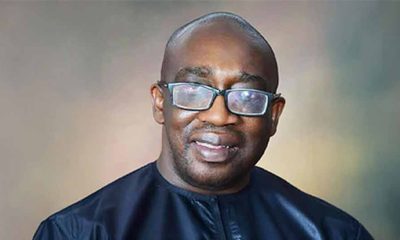
 metro3 days ago
metro3 days agoTinubu appoints Jami’u Abiola as Senior Special Assistant
-
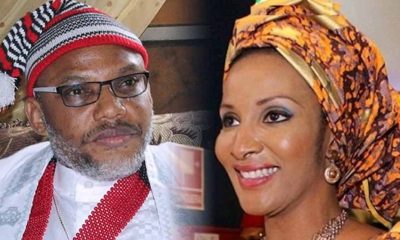
 metro3 days ago
metro3 days agoBianca raises hope Tinubu will free Nnamdi Kanu to restore peace in South-East
-
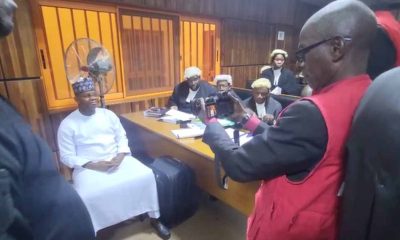
 metro3 days ago
metro3 days agoDrama as Yahaya Bello calms supporters after judge storms out of court over rowdiness
-

 metro2 days ago
metro2 days agoWhy we relocated Osun airport — Gov Adeleke
-

 News22 hours ago
News22 hours agoNo child should go to bed hungry, Tinubu seeks French investment in Nigeria’s food security
-

 metro2 days ago
metro2 days agoJUST IN: DSS arrests Kano-based activist over suspected Facebook post
-

 Business3 days ago
Business3 days agoPH refinery to blend 1.4-million litre petrol daily – NNPC

